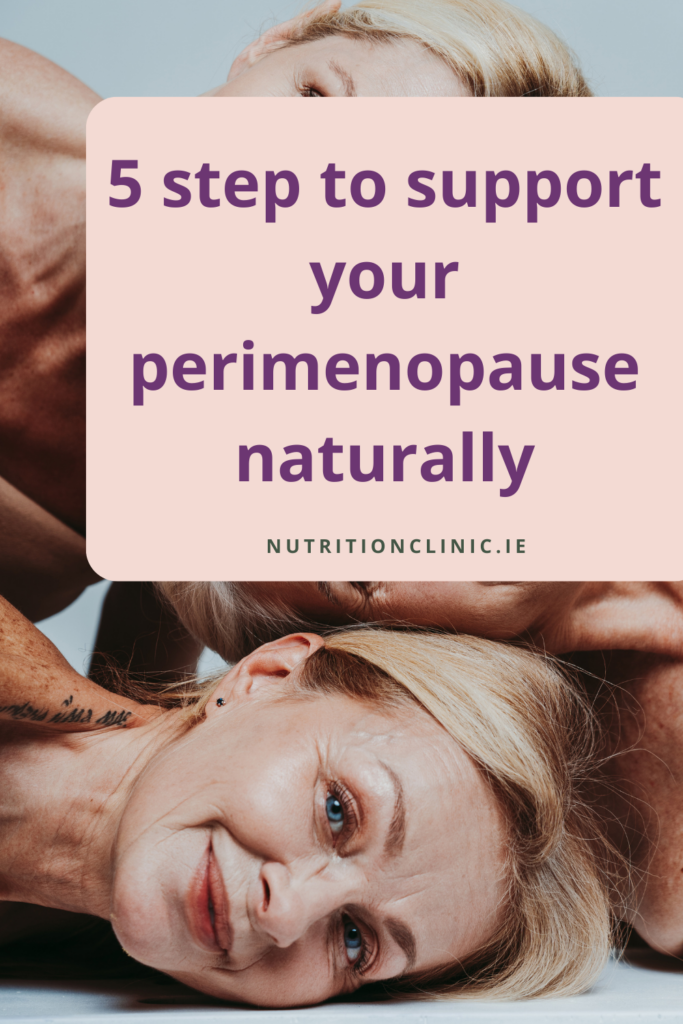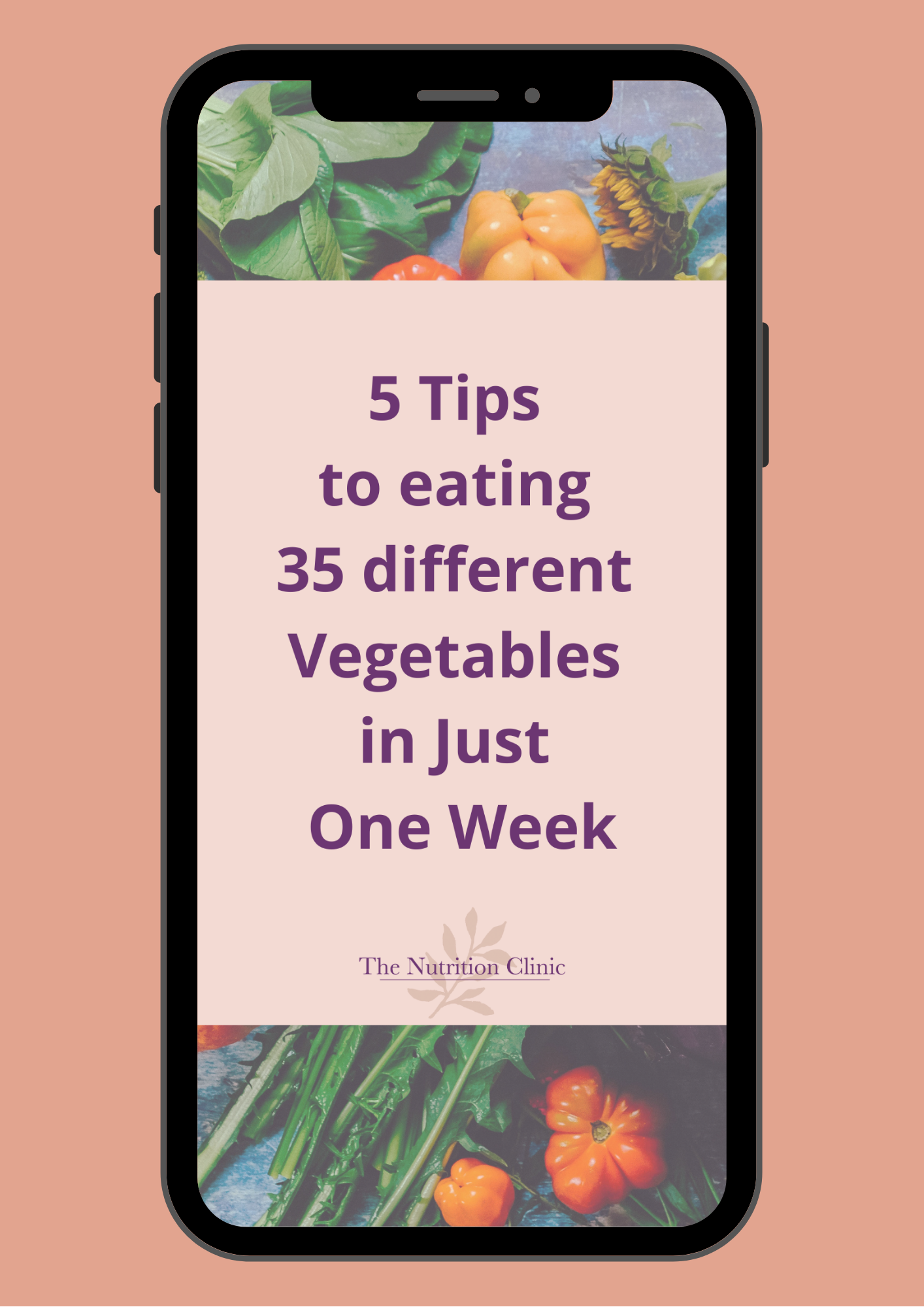Are you ready to embrace your perimenopause journey with a natural and empowering approach? The list of symptoms you may experience in perimenopause are many, and sometimes unpleasant. However, you do not need to put up with these symptoms or feel that they are a right of passage that needs to endured. In this blog post I’ll share with you 5 areas that you can focus on that will form the basis of better health both during perimenopause and beyond. Let’s dive in!
Nourishing your body with wholefoods
Getting back to basics with food is the best approach at any age. There is no miracle diet out there and that’s no different for perimenopause. And lets face it, many of these wonder diets are so different to the way we normally eat or how we live, that they create more stress at a time when we need less.
While you should focus on the points below, making sure that you enjoy what you eat and that it fits in with your life is the most important for you to focus on.
- Making sure that you have a mix of good quality protein at each meal will ensure that your body has what it needs to maintain muscle mass and carry out repairs. Protein will also slow down the energy release from your meals, which in turn will protect against insulin resistance (see below).
- Carbohydrates are probably the foods that have the most confusion around them. However, staying away from ultra-processed foods and sticking to wholegrain, wholefoods is a good start. Having a half-plate of vegetables with each meal will also deliver much need nutrients and polyphenols, as well as fiber to support your gut health and lower inflammation.
- Healthy fats also form part of a beneficial diet. Inflammation is the driver of many health complaints, no less so during perimenopause. Healthy fats help to reduce inflammation. In particular the omega-3 fats found in oily fish such as salmon, mackerel and sardines. Healthy fats are also present in olive oil and nuts and seeds.
Cutting back on sugar
Without sounding like a spoil sport, we are more at risk of developing insulin resistance as we move through our 40’s and beyond menopause. Mainly due to losing oestrogen, our sensitivity to insulin is reduced. What does that mean? When our digestive system releases the energy from the food we’ve eaten into the blood stream, Insulin picks it up and brings it around to the cells so they can use that energy. However, now due to lower oestrogen they are not opening their door to insulin as quickly as they used to. This means that the body has to send out more insulin than before just to get the cells to accept it. This can make us feel tired, and oddly, even more hungry! Eventually Insulin will squeeze the energy into storage (our fat cells) just to put it somewhere. Hence weight gain is common through the perimenopause, even if you haven’t drastically changed what you eat.
While you may have been able to snack on sugary foods in your 20’s and not noticed any impact. That may not be the case now.
This insulin resistance also drives inflammation in the body. This can lead to poorer sleep, night sweats, joint pain, as well as the aforementioned weight gain.
What can you do?
It doesn’t mean you have to cut sugary foods completely. Being able to enjoy a dessert with family at the weekend, or a slice of cake when out for coffee with your friends is part of enjoying life.
It’s the everyday inclusion of sugary or refined, processed foods that’s the issue. These foods raise our blood sugars higher and faster than their wholegrain, or higher fiber counterparts. This means more insulin than may be needed is being released. Swapping these foods for those higher in fiber, protein and / or healthy fats will slow that energy release down.
For example swapping the biscuit with your tea for a handful of nuts will add healthy fats, protein and fiber to your snack. This means you’ll get longer from the snack energy wise and less insulin is needed overall. Replacing any white, refined carbohydrates for higher fiber, wholegrain alternatives will also lower the overall sugar spike.
Supporting your gut health
The role of our gut in female health in general is important no matter what stage you’re at. However, in perimenopause when hormones are in a state of flux, with oestrogen being high one minute and low the next, gut health is key. Poor gut health can lead to increased inflammation, making perimenopause symptoms of heavy periods worse. However, looking after your gut health can help to reduce any inflammation, improve stress and support a more balanced mood.
How can you support better gut health?
Firstly, by making sure you have a bowel movement each day. This ensures that your body is eliminating the hormones it’s already used and cleared by your liver. If these are left to hang around in your bowel, it increases the chances of them being re-taken up and in a more potent form. Swapping refined grains for wholegrains will add more fiber (as well as supporting lower insulin!). Adding in other high fiber foods like avocado, nuts, seeds, oats, beans and lentils will also add more soluble fiber that helps with better bowel movements.
Supporting the growth of beneficial gut bacteria will also keeps tabs on the less desirable bacteria that can cause inflammation and increase the re-uptake of the oestrogen. Adding in fermented foods such as sauerkraut, kimchi and kefir will feed your microbiome and help to diversify it. Adding in more plant foods in general also help to grow and nurture your microbiome.
Nurturing your natural body clock (AKA your Circadian rhythm)
Poorer sleep can be one of the first changes you may notice as you enter your 40’s. I know it’s a big one for me. During perimenopause it could be a problem of falling asleep, or waking more often at night. In menopause it’s more likely to be waking earlier.
This can be due first to the drop off in progesterone and then oestrogen and the impact that has on the brain. The brain has now to get used to functioning with less of these around. As it does so, it can impact your circadian rhythm, or natural body clock, as well as our ability to cope with stress. Other causes of poorer sleep could be the natural reduction in melatonin (the sleep hormone) as we age, or any of the other symptoms that come with perimenopause, such as night sweats.
Protecting your sleep as much as possible during this time will help with many of the other symptoms of perimenopause. With lack of sleep we’re more likely to eat more, be more irritable and respond less well to stress
One way of nurturing better sleep is to support the circadian rhythm. All your cells in your body run off an internal clock, which is your circadian rhythm. Keeping them synchronised and on schedule is the best way to nurture better health overall. This includes metabolism, mood, response to stress and of course sleep.
How can you do this?
Better sleep starts in the morning. Make sure you get outside in the morning as soon as you can for 10-20 minutes, without sunglasses. This is the first synchronisation for the master clock. This is followed by another synchronisation around mid-day. So getting out in the fresh air when you can during the day will help.
Avoiding blue light later in the day, in particular the two hours before bed-time, will help to nurture our melatonin. Bluelight blockers are on all the phones these days, but coming into winter you may find you have more screen time compared to the summer. Being conscious of this and switching to reading a book, or relaxing with music before bed may help.
And finally creating a routine around sleep, by going to bed at the same time each day. As lovely as a lie-in may sound, waking up at the same time each day will also send the right signals to your internal clock.
Move your body
As we age we naturally lose muscle mass. Combine that with a higher risk of osteoporosis post menopause, mood swings, increased anxiety, weight gain and poorer sleep to name a few. Moving and building strength couldn’t be more important at this stage in a woman’s life.
While the last thing you may feel like doing is hitting the gym after a bad night’s sleep, adding in some movement each day has been shown to reduce hot flashes, night sweats and improve sleep. This doesn’t need to be training for iron woman, even going for a brisk 20 minute walk has been shown to improve brain health in post-menopausal women.
By increasing our movement overall, we’re encouraging our cells to respond better to insulin. So we’re lowering our risk of insulin resistance and the negative effects of that. Continuing to build muscle throughout this time will also protect against bone fractures by lessening frailty later in life.
Start with what you enjoy and build it up from there. As your energy and strength improves, so to will your desire to add in more and keep it consistent.
Where will you start?
While the perimenopause may seem daunting, it’s also the gateway to the next stage in your life. Whether you need the added support of HRT or not, focusing on these five steps will support your body through this transformation in a holistic and balanced way.
If you’re not sure where you should start, or you would just like a chat to talk it over, book in for a free 20 minute health review call and we can see how you can start nourishing you through your perimenopause journey today.




0 Comments